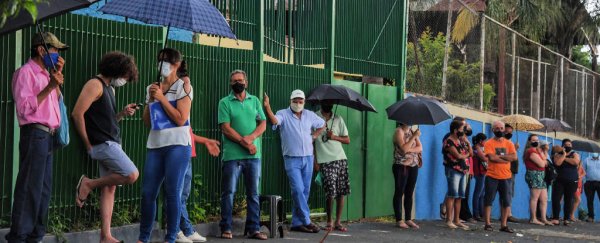We all desperately want this global pandemic to end, but that won't happen for many more years if the wealthiest nations don't share their vaccines with the rest of the world, argue health experts.
By mid-February 2021, 191 million vaccination shots had been administered, and more than three quarters of those were received in just 10 countries, according to the United Nations.
In contrast, by that same time, roughly 130 nations, which together include 2.5 billion people, had been given no shots at all. Not a single one.
Public health expert Gavin Yamey is the latest to join a chorus of other concerned voices calling upon rich nations to stop 'hoarding' COVID-19 vaccines.
In a recent Nature commentary, the Duke University professor uses game theory to explain why 'vaccine nationalism' is ultimately selfish and self-defeating.
If the richest in the world continue to hoard vaccines, he argues, the global pandemic may potentially drag on for as long as seven more years.
"There's a mantra in global health that an outbreak anywhere could lead to an outbreak everywhere, and that's why it's in our interest collectively as an international community to start sharing doses (and) to make sure we expand the global vaccine supply," Yamey said in a media briefing on his Nature commentary.
A few days after the commentary was published, it was revealed that Italy is blocking shipments of the AstraZeneca vaccine to Australia due to ongoing frustrations over supply shortages in the European Union.
Buying vaccines does not have to be a zero-sum game, Yamey and his colleagues have shown.
Instead, there are ways we can guarantee equitable access to COVID-19 vaccines worldwide while still investing in doses. Agreements between manufacturers and wealthy nations, for instance, could simultaneously help expand global supplies and manufacturing elsewhere in the world.
"As nations, we are like ships on an ocean," Yamey explains, "and we're going to rise and fall together."
Yamey points to the new COVID-19 Vaccines Global Access Facility (COVAX) as a good example of how to keep us all afloat in these unprecedented times.
The program, co-led by Gavi, the Vaccine Alliance; the Coalition for Epidemic Preparedness Innovations; and the World Health Organization (WHO), creates a 'buyers' pool in which wealthier nations can purchase vaccines in a way that ensures supply and development to poorer places.
So far, around 190 nations have joined COVAX, and yet close to three dozen wealthy nations ended up buying their vaccines directly from suppliers and not through the 'buyers' pool. In the end, that means 16 percent of the world's population has bought more than half of all available doses.
The agreement between the United States Department of Health and Human Services (HHS) and Pfizer/BioNtech, for instance, is designed to benefit the US and Pfizer, "but no one else."
This "me first" approach represents a major threat to achieving herd immunity at a global scale, experts say. Not only will this condemn people to death and sickness merely through the luck of their birthplace, it gives the virus a chance to mutate in a way our current vaccines may not account for.
"There is no way to stop wealthier countries from pursuing these deals, but COVAX can influence how such deals are made, so that more of these deals are beneficial to the rest of the world… and not simply 'vaccine grabs' that take doses away from everyone else (like the HHS deal)," Yamey and his colleagues wrote in another recent commentary for BMJ Global Health.
Both these commentaries follow recent statements from the director general of WHO, Tedros Adhanom Ghebreyesus, who warned in January that the world was "on the brink of a catastrophic moral failure", where only wealthy people are protected from COVID-19, at least in the short-term.
Others, like philosopher Nicole Hassoun have since argued "vaccine nationalism is neither ethically justified, nor even in rich countries' long term self-interest."
So what is the better option? In his new commentary, Yamey argues wealthier nations need to share their vaccines as soon as possible. For every nine doses they administer, he suggests donating one dose to COVAX. This is hardly 'equitable', he admits, but it's "within what is possible" and could stop the emergence of future variants and outbreaks.
Such action could also save the world a lot of money. One recent study found if poorer nations are not vaccinated for several years, the global economy could lose US$9 trillion from a disruption in global supply chains. Rich nations would bear half that cost.
Putting basic health systems in place that improve the global supply of vaccines, enhance supply-chain harmonization and articulate guiding principles so that everyone benefits from this medicine is not just the right thing to do ethically or economically, it's also the best way to end a global pandemic for everyone.
The commentary was published in Nature.
